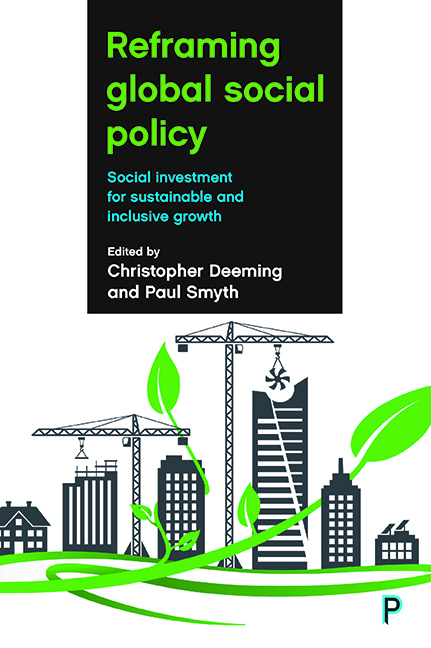One - Social investment, inclusive growth that is sustainable and the new global social policy
Published online by Cambridge University Press: 12 April 2022
Summary
Introduction
Over the past two decades, there has been a fundamental reappraisal of the economic value of social policy, coming from a number of different directions. The first is the adoption of the ‘social investment perspective’ (OECD, 1997a: 14) in the advanced economies, as the old post-war welfare states were reformed in an attempt to address the ‘new social risks’ associated with post-industrial society. The social investment perspective in social policy appeared to offer a plausible alternative to neoliberalism and the neoliberal critique of welfare (and the discussions about ‘permanent austerity’ and ‘welfare state retrenchment’ that proliferated during the 1990s and early 2000s). The second major shift was the transition from the so-called ‘Washington Consensus’ towards ‘pro-poor growth’ policies and ‘inclusive growth’ policy frameworks for reducing poverty in developing country contexts in the Global South (with an ‘emphasis on increasing the opportunities for the poor to contribute and benefit from the growth process’, as the World Bank observes, 2008: 7). Third, and related, is the shift in policy perspective at the OECD in response to rapidly rising inequality in the advanced economies (OECD, 2008, 2011a, 2015b), as international organisations and epistemic communities began to diffuse ideas for inclusive growth (OECD, 2013a). Finally, there is the environmental imperative of ‘sustainability’ that is shaping the new global development agenda (Sachs, 2015). Today, we find that socially inclusive models for sustainable growth and development offer policymakers in the Global North (as well as the South) a plausible remedy to address rising social inequality. Although initially quite independent, these intellectual movements and literatures, orientated towards investment and inclusion, have now begun to converge and coalesce and are increasingly seen to contribute towards a single analytical framework and shared policy agenda for human development and flourishing.
In this chapter we consider the emerging global social policy frameworks for inclusive growth and social investment, and draw out the sometimes similar and sometimes quite distinctive insights that these two policy perspectives now bring to our understanding of the relationship between economy and society in the 21st century, and for the future development of global social policy more generally.
- Type
- Chapter
- Information
- Reframing Global Social PolicySocial Investment for Sustainable and Inclusive Growth, pp. 11 - 44Publisher: Bristol University PressPrint publication year: 2017

